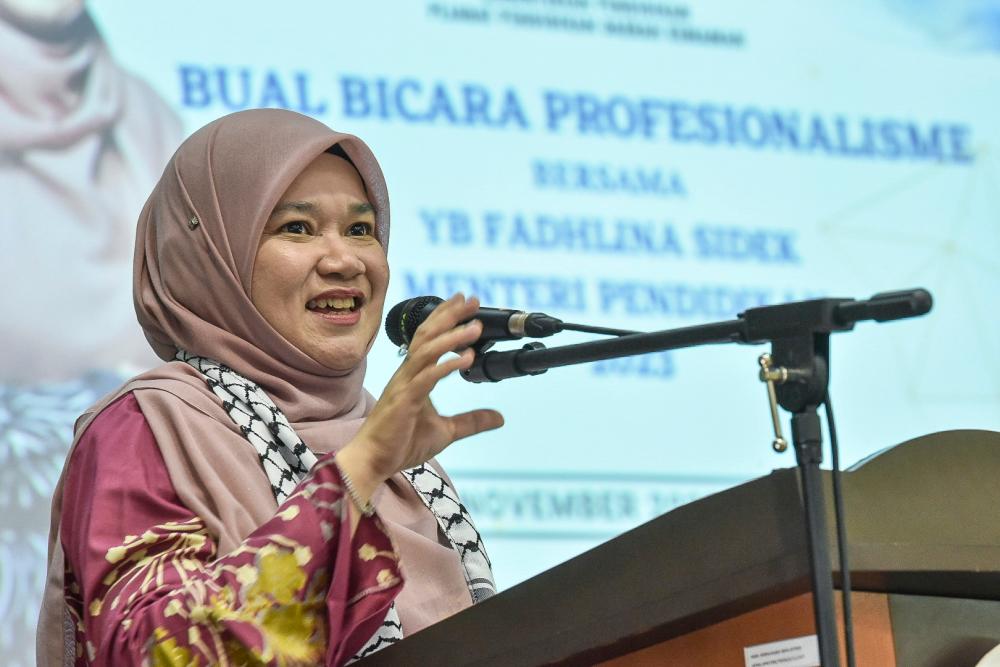PUTRAJAYA: Character education; basic literacy in reading, writing, and numeracy (3M); and integrated learning are the new approaches incorporated by the Ministry of Education (MOE) in the 2027 School Curriculum.
Education Minister Fadhlina Sidek said the curriculum, which was framed on standard-based and competency-oriented curriculums, aimed to produce knowledgeable and competent students, with an optimal balance in providing quality education.
“We chose a fresh approach for the 2027 curriculum, to have a specific time slot for character education and focus on practical socio-emotional learning from Preschool to Higher Secondary levels,” she said during a speech at the MoE 2027 School Curriculum professional talk here, today.
Fadhlina said the MoE was committed to ensuring students mastered the 3M as early as possible to successfully move on to the next level as failure to do so would prevent them from realising their potential.
She said early intervention would be practised to help students facing problems in mastering literacy and numeracy skills before they were moved up to the next level.
Fadhlina said there would be a specific slot in the timetable for the Integrated Learning Class to be introduced in primary schools.
“This Integrated Learning Class uses a teaching and learning approach that combines content and skills from various disciplines.
“Students will learn to apply knowledge, skills, and values in a holistic learning experience that is meaningful, relevant, and connected to the real world,” she said.
Fadhlina said the Preschool curriculum would focus on confident communication and socialising skills, as well as instilling qualities of caring, resilience, problem-solving ability, and the desire to learn through play and exploration.
She said the 2027 School Curriculum would divide primary school students into three levels, namely Level One (Years One and Two); Level Two (Years Three and Four); and Level Three (Years Five and Six).
She said the main focus in Level One was the mastery of literacy and numeracy skills as well as character development with more entertaining learning experiences to spark interest in students to learn in a formal environment and attend school.
Level Two’s main focus would be mastering the skills of applying knowledge to solve problems as well as character development, she added.
She said Level Two learning would also be expanded to more challenging aspects that required higher cognitive stimulation and students could be exposed to elements of Technical and Vocational Education and Training (TVET) such as life skills, technology, and digitalisation, much earlier.
“Level Three will involve groups of students in Years Five and Six with the main focus of learning on mastering analytical skills and creating innovation.
“It also focuses on improving cognitive ability and character development. This level is the preparation for high school,“ she said.
Fadhlina said students in Lower Secondary involving Forms One to Three, would be allowed to explore various fields of knowledge and be encouraged to recognise their interests and potential, including talent development and character building.
“Higher Secondary Education is Fourth and Fifth Form students who will be guided towards the path of their chosen field in higher education and prepare them to be part of society.
She said the 2027 School Curriculum would be implemented in stages, starting with Preschool in 2026, and Years One and Form One in 2027.
In terms of assessment, Fadhlina said the curriculum would implement more classroom-based assessments aimed at identifying the strengths and weaknesses of students, and how the teaching and learning process could be modified to improve students’ mastery.
“Teachers will evaluate the holistic learning process that students go through to help them improve their ability and potential in the tasks assigned,“ she said. - Bernama









